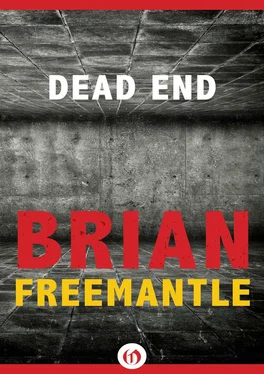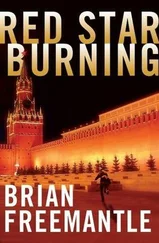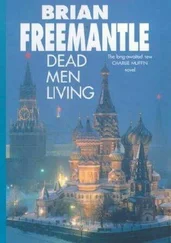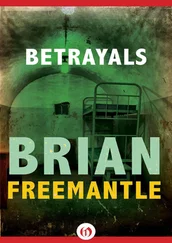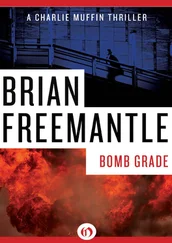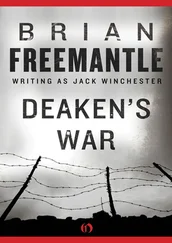Brian Freemantle - Dead End
Здесь есть возможность читать онлайн «Brian Freemantle - Dead End» весь текст электронной книги совершенно бесплатно (целиком полную версию без сокращений). В некоторых случаях можно слушать аудио, скачать через торрент в формате fb2 и присутствует краткое содержание. Жанр: Триллер, на английском языке. Описание произведения, (предисловие) а так же отзывы посетителей доступны на портале библиотеки ЛибКат.
- Название:Dead End
- Автор:
- Жанр:
- Год:неизвестен
- ISBN:нет данных
- Рейтинг книги:3 / 5. Голосов: 1
-
Избранное:Добавить в избранное
- Отзывы:
-
Ваша оценка:
- 60
- 1
- 2
- 3
- 4
- 5
Dead End: краткое содержание, описание и аннотация
Предлагаем к чтению аннотацию, описание, краткое содержание или предисловие (зависит от того, что написал сам автор книги «Dead End»). Если вы не нашли необходимую информацию о книге — напишите в комментариях, мы постараемся отыскать её.
Dead End — читать онлайн бесплатно полную книгу (весь текст) целиком
Ниже представлен текст книги, разбитый по страницам. Система сохранения места последней прочитанной страницы, позволяет с удобством читать онлайн бесплатно книгу «Dead End», без необходимости каждый раз заново искать на чём Вы остановились. Поставьте закладку, и сможете в любой момент перейти на страницу, на которой закончили чтение.
Интервал:
Закладка:
None of the mice he’d injected with the French-suggested drug modifications showed any obvious ill effects after the forty-eighty-hour period, and he was halfway through extracting blood comparisons when Beverley Jackson arrived.
She said at once: ‘We going to learn all today?’
‘You finished the flu-identification papers?’ avoided Parnell.
‘Almost.’
‘I didn’t get a lead.’
‘I haven’t either, not yet.’
‘Let’s hope you do before you finish. Or one of the others might come up with something.’
‘You didn’t answer my question,’ she said.
‘No,’ Parnell agreed, turning back to his sampling.
He was conscious of other arrivals behind him but didn’t respond to them until he had the tests from all the experimental mice on to slides. He turned back into the main laboratory unsurprised to find himself the focus of everyone’s attention. He said: ‘This has nothing to do with what we’re looking for. It’s something I set up over the weekend. Anyone come up with anything, anything at all, from what you’ve read so far?’
There were various head-shakes. Deke Pulbrow said: ‘Not a godamned thing.’
Sean Sato said: ‘It’s great research but there’s nothing here that’s going to help us.’ . ‘I haven’t found anything either,’ conceded Parnell, again. ‘Let’s talk about it when we’re all through.’ He’d tell them as much of the truth as he felt able, Parnell finally determined. Not about his suspicion that Rebecca’s death was somehow connected with the French material, but that he had become curious at the apparent secrecy in which it had been chemically tested, and had decided to put it through the most basic of genetic programmes without interfering in any way at all with what they were concentrating upon.
Parnell worked with total concentration, able as he always had been to isolate himself from all or any surrounding distraction, bow-backed over his microscope to contrast his before-and-after slides, anxious for a variation he didn’t find. Reluctant to accept yet another disappointment – at the same time objectively warning himself that there should not be any change after Russell Benn and Dwight Newton’s medical clearances – he repeated every examination under stronger magnification. And once more found nothing.
With growing, unwelcome resignation, Parnell eventually turned to his own before-and-after blood specimens, starting at the lower magnification, and for the briefest of seconds not fully absorbing what he was seeing. Parnell was too consummate a professional to accept a single illustration. Patiently, although with increasing satisfaction, he checked every single treated and untreated slide, one against the other, and obtained the same result in every case. It was only when he pushed his stool away from his bench, stretching against the aching tension in his back and shoulders, that Parnell became properly aware of how tightly and how long he had been hunched over his microscope. It was a fleeting discomfort, virtually at once compensated by a surge of excitement. Which, in turn, was tempered by further inherent professionalism. He had positive findings from a lot of separate, uncontaminated tests. Which in his own opinion was unequivocal. But which, by the standards of research – and certainly the challenge he would have to face – was insufficient. There had to be separate, independent experiments, with no prior, alerting indication of what the expected result might be. And he needed to duplicate everything himself – on himself – against the remote possibility that this initial analysis had inadvertently been contaminated to produce a faulty result.
Only Ted Lapidus was still reading when Parnell emerged into the main laboratory, surprised to find it was already noon. The rest of the unit looked up at him in solemn expectation. He said: ‘Any bright, shining pathways?’
There was a further series of head-shaking. Mark Easton said: ‘In the words of the prophet, back to the drawing board.’
‘I want everything temporarily suspended, at least for the rest of today,’ announced Parnell. ‘I’m asking all of you to conduct blind blood-sampling, using your own blood, involving something Dubette is making available on a limited market.’
‘What are we looking for?’ asked Lapidus, coming up from his final paper.
‘Blind tests, like I said,’ refused Parnell. ‘No prior indication. I don’t want us challenged on this.’
‘We’re bypassing phase-one animal assessment?’ queried Battey.
‘Yes,’ acknowledged Parnell.
‘Why the mystery?’ demanded Beverley.
‘There isn’t one. I want independent, corroborative findings, that’s all.’ Or was it all, he asked himself.
Parnell refined – and extended – the confirming experiments, testing upon the altered Dubette medicines before individually duplicating the experiments by separately adding liulou-sine, beneuflous and rifofludine. Having already established the research once, Parnell completed the repetition ahead of everyone else. He withdrew briefly to his side office, to avoid the appearance of hovering over them, but used the vantage point to watch them at work. Once again he was impressed at how quickly – and expertly – they had unquestioningly adjusted to his limited briefing.
Beverley was the first to finish of the rest of the group. As Parnell came out into the main laboratory, she said: ‘I expected to sweat blood, not give it!’
‘This is a one-off situation,’ said Parnell.
‘I hope it is,’ said Lapidus. ‘I’ve never gone along with this scientist-test-yourself mumbo-jumbo.’
‘Neither have I,’ assured Parnell. ‘As I said, it’s a one-off.’
‘When do we know what it’s all about?’
He didn’t know, Parnell acknowledged. The mutation on his own initial self-experiment had shown after forty-eight hours, but it could have occurred far quicker than that. He should have monitored it during the Saturday, and most certainly have checked on the Sunday. Not having a time sequence risked his first findings being dismissed as flawed research. ‘Let’s give it an hour.’
‘What were you doing when we arrived?’ pressed Sato.
‘I’ve duplicated everything, for a comparison.’
‘You expect us to do that too?’ demanded Battey.
‘No,’ assured Parnell. ‘If your findings match mine – and my second tests corroborate – that’ll be enough.’ Should he set up a meeting with Dwight Newton in advance? There was every reason to move as quickly as possible if his findings were confirmed and the French subsidiary were already in production. But his findings weren’t yet confirmed. And until they were he couldn’t risk setting off alarm bells and challenging a company vice president and the director of chemical research.
There was another familiar hiatus throughout the unit. Sean Sato and Deke Pulbrow returned to their earlier contrasting of chicken and human DNA strings. Parnell told Kathy Richardson how he wanted the San Diego and London research filed, and dictated letters to both institutions congratulating them upon their exploratory work but regretting it hadn’t led them anywhere.
Parnell adhered strictly to his hourly check. There was no mutation on any of his carefully prepared petrie dishes. One by one, unasked, the rest of the unit ran their own checks on their own experiments. There was no response from anyone.
Impatiently Lapidus said: ‘I really don’t see why we can’t be told what we’re looking for!’
Neither did he now, conceded Parnell. It was overly cautious, imposing blind comparisons as he had: he deservedly risked the ridicule of the rest of the unit – whose respect he believed he’d had until now – if his cultures were inconclusive. ‘You’ll see it soon enough.’
Читать дальшеИнтервал:
Закладка:
Похожие книги на «Dead End»
Представляем Вашему вниманию похожие книги на «Dead End» списком для выбора. Мы отобрали схожую по названию и смыслу литературу в надежде предоставить читателям больше вариантов отыскать новые, интересные, ещё непрочитанные произведения.
Обсуждение, отзывы о книге «Dead End» и просто собственные мнения читателей. Оставьте ваши комментарии, напишите, что Вы думаете о произведении, его смысле или главных героях. Укажите что конкретно понравилось, а что нет, и почему Вы так считаете.
